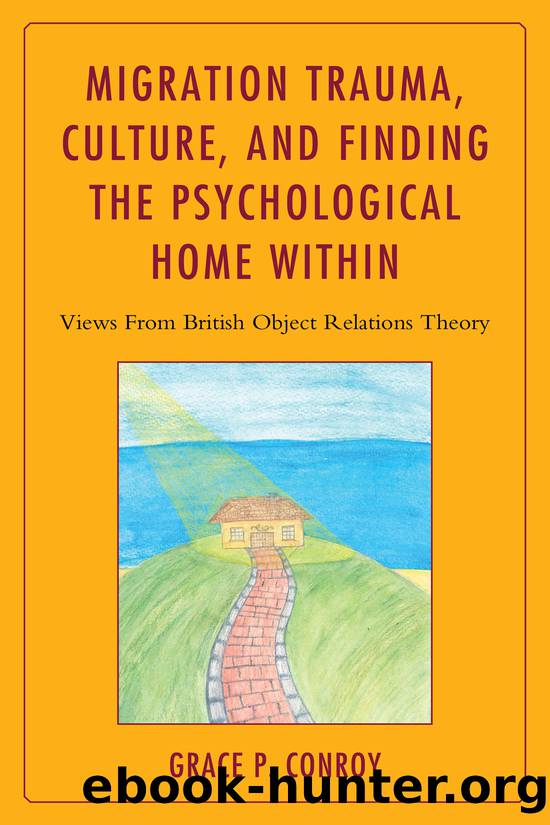Migration Trauma, Culture, and Finding the Psychological Home Within by Conroy Grace P.;

Author:Conroy, Grace P.;
Language: eng
Format: epub
Publisher: Rowman & Littlefield Publishers, Incorporated
Chapter 4
Concluding Analysis of Composite Cases
In each presented composite case study, migration created a crisis in the patient/subjectâs life and identity. Each composite case illustrates different developmental issues and different generations (1st, 2nd and 1½) of migrants. By analyzing each case studyâs problems and difficulties one can better infer what are the healthier solutions to the process of migration and who makes a successful migration to a new world.
One may deduce that a more successful migrant does not carry the type of emotional and psychological baggage that is presented in these composite migration stories. So a healthier migrant is not necessarily making a major escape from his internal issues via migration and, if to some degree he does, then he would have to work through them in a new culture, because these issues will not go away in the new environment.
In any case, the migration process represents a form of crisis and the identity will get destabilized. They are some migrants that may have the capacity to recover from such a crisis and identity destabilization rather quickly. But when someone is making a âmajor escapeâ from their internal issues via migrations, the impact of the migration will create more internal and external problems.
What literature and the above case studies suggest is that if one is moving a physical and psychological home from one culture to another, one inevitably will have to readjust both internally and externally to a new place and physical home. One will have to work through different types of anxieties, losses, and changes. In a successful migration the identity of the migrant is preserved and enhanced by the migration process.
In situations where a migrantâs identity is already problematic the migration will become an additional trauma, intertwined with pre-existing problems.
ELAâS COMPOSITE CASE
Elaâs composite migration story represents a so-called one-and-a-half generation migrant. She migrated to America with her parents when she was in her adolescence. She had real knowledge of what it is like to be born and live in Eastern Europe. Ela had deep roots to her home country and her Eastern European identity was already evident. She was comfortable in her home country and her migration was involuntary and felt like an exile from her native home.
Elaâs early separation-individuation process from her mother was already severely problematic in her home country. The process of migration made Elaâs separation-individuation process even more problematic, and she got caught up into all sorts of manic escapes from her internal mother via identity reinventions, etc. Because this fundamental separation issue was not worked through in her home country before migration, her manic defenses after the migration became even more extreme.
In fact, after the migration to America, the whole family became more closed off and suspicious about the external world. The parents had their own unworked-through traumas before the migration, and after migration her fatherâs drinking problem increased, the mother became more anxious, and the whole family became more enmeshed.
The premigration family issues worsened and the parents and children were forced to fall back upon each other.
Download
This site does not store any files on its server. We only index and link to content provided by other sites. Please contact the content providers to delete copyright contents if any and email us, we'll remove relevant links or contents immediately.
The Vikings: Conquering England, France, and Ireland by Wernick Robert(79222)
Ali Pasha, Lion of Ioannina by Eugenia Russell & Eugenia Russell(39940)
The Vikings: Discoverers of a New World by Wernick Robert(36831)
The Conquerors (The Winning of America Series Book 3) by Eckert Allan W(36715)
Cecilia; Or, Memoirs of an Heiress — Volume 1 by Fanny Burney(32093)
Cecilia; Or, Memoirs of an Heiress — Volume 3 by Fanny Burney(31481)
Cecilia; Or, Memoirs of an Heiress — Volume 2 by Fanny Burney(31435)
Empire of the Sikhs by Patwant Singh(22780)
Hans Sturm: A Soldier's Odyssey on the Eastern Front by Gordon Williamson(18341)
The Secret History by Donna Tartt(18269)
Cat's cradle by Kurt Vonnegut(14804)
Sapiens: A Brief History of Humankind by Yuval Noah Harari(14006)
Pimp by Iceberg Slim(13828)
Talking to Strangers by Malcolm Gladwell(12916)
Norse Mythology by Gaiman Neil(12880)
Leonardo da Vinci by Walter Isaacson(12833)
Underground: A Human History of the Worlds Beneath Our Feet by Will Hunt(11857)
4 3 2 1: A Novel by Paul Auster(11843)
The Radium Girls by Kate Moore(11652)
